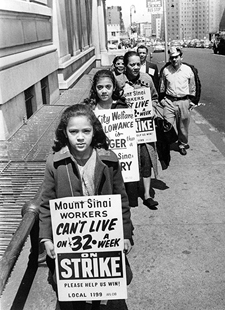
On this day in labor history, the year was 1959.
That was the day Operation Humanity marched in support of New York City hospital workers fighting for union recognition and bargaining rights at area voluntary hospitals.
Workers organizing with Local 1199 had been on strike since May 8 and called on the public to support them in their efforts.
They pointed out that the 30,000 overwhelmingly black and Latino workers were fighting against economic exploitation and discrimination.
Striking workers condemned their paltry wages, which averaged $21 less a week than workers at city hospitals.
They added they had no job security or benefits and were not even eligible for unemployment.
The Central Labor Council, the NAACP and area civil rights activists all supported the march.
In their book, Upheaval in the Quiet Zone, Leon Fink and Brian Greenberg noted that “a union largely led by Jews had squared off against hospitals directed by the scion’s of the city’s Jewish Community…to the degree that it was a ‘family affair,’ the 1959 fight thus took on the bitterness of a civil war.”
As well, Catholic trade union leaders decried the anti-union fervor of the hospitals run by the Archdiocese.
Fink and Greenberg illustrate the support of fiery Mike Quill, president of TWU local 100, who denounced hospital trustees as worse than famed segregationist Governor Orval Faubus of Arkansas.
Weeks into the strike, area trade unions supplied reinforcements in the form of donations, loans and groceries.
Local IBEW members assessed themselves $1 a week for the strikers.
Many unions regularly joined picket lines in support.
Though the strike would fail to secure union recognition and collective bargaining rights, there were minimal gains.
Solidarity galvanized the membership for future battles.
More Episodes
 2024-02-24
2024-02-24
 2024-02-20
2024-02-20
 2024-02-18
2024-02-18
 2024-02-17
2024-02-17
 2024-02-17
2024-02-17
 2024-02-13
2024-02-13
 2024-02-10
2024-02-10
 2024-02-07
2024-02-07
 2024-02-07
2024-02-07
 2024-02-07
2024-02-07
Create your
podcast in
minutes
- Full-featured podcast site
- Unlimited storage and bandwidth
- Comprehensive podcast stats
- Distribute to Apple Podcasts, Spotify, and more
- Make money with your podcast
It is Free
- Privacy Policy
- Cookie Policy
- Terms of Use
- Consent Preferences
- Copyright © 2015-2024 Podbean.com




